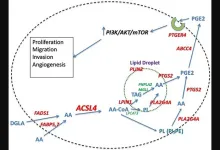Further hope for base-edited T-cell therapy to treat resistant leukaemia
Peer reviewed | Experimental study | People
2023-06-14
(Press-News.org) Three young patients with relapsed T-cell leukaemia have now been treated with base-edited T-cells, as part of a ‘bench-to-bedside’ collaboration between UCL and Great Ormond Street Hospital for Children (GOSH).
The data from the NHS clinical trial, published in The New England Journal of Medicine and funded by the MRC, shows how donor CAR T cells were engineered using cutting edge gene editing technology to change single letters of their DNA code so they could fight leukaemia.
The experience of using the cells in three patients is shared, and includes 13-year-old Alyssa from Leicester, who last year was the first person in the world to be treated on the trial for T-cell acute lymphoblastic leukaemia (T-ALL)*. This is a cancer of white blood cells and is usually treated with chemotherapy, but if it comes back, can be hard to clear.
Within four weeks of receiving the cells Alyssa’s leukaemia was undetectable and she went on to have a successful bone marrow transplant, and is still well and at home almost a year later.
A second teenager cleared their leukaemia within a similar time period and is now recovering at home after their transplant. Sadly, while a third child responded to the CAR T cell therapy, their course was complicated by serious infections and their family agreed with the clinical team to move to palliative care.
This first human application of base-editing technology was designed and developed by a team of researchers at UCL, led by Professor Waseem Qasim (UCL Great Ormond Street Institute of Child Health and Honorary Consultant at GOSH), working with Dr Robert Chiesa and the Bone Marrow Transplant/CART/Haematology teams at GOSH.
The project is supported by the Wellcome Trust and National Institute of Health and Care Research (NIHR).
Professor Waseem Qasim, Professor of Cell and Gene Therapy at UCL, said: “It’s nice to be able to see the fruits of a long period of work coming together from multiple teams and being brought into play for new treatments. It’s still early, and we need more follow up and to treat more patients to know how it might impact treatments long term.”
Dr Robert Chiesa said: “It is really crucial that children affected by cancer who failed standard of care have access to innovative strategies in the context of clinical trials such as this. A research hospital such as GOSH offers the ideal setting for developing experimental approaches that might offer hope to children with otherwise very poor prognosis. This is possible due to the dedication of scientists, doctors, nurses and allied professionals working for these children and their families.”
To generate banks of ‘universal’ anti T-cell CAR T-cells for the study, the researchers used healthy donor T-cells, arranged by the Anthony Nolan registry. They then made changes to the cells using ‘base editing’, which works by chemically converting single nucleotide bases (letters of the DNA code) which carry instructions for a specific protein, in order to prevent them being produced.
The steps were:
Removing existing receptors so that T-cells from a donor can be banked and used without matching – making them ‘universal’.
Removing a ‘flag’ called CD7 that identifies them as T-cells (CD7 T-cell marker). Without this step the T-cells – which are designed to recognise and attack cancerous cells – could also kill each other.
Removing a second ‘flag’ called CD52. This makes the edited cells invisible to some of the strong drugs given to the patient during the treatment process.
Adding a Chimeric Antigen Receptor (CAR) which recognises the CD7 T-cell receptor on leukemic T-cells. The cells become armed against CD7 and recognise and fight T-cell leukaemia.
Professor Qasim said: “Base editing involves making changes to single letters of DNA code to change signals and stop genes being expressed, without having to make a cut to the chromosomes. It works really well for engineering T cells.”
The clinical trial for this treatment is still open and aims to recruit up to 10 NHS patients with T-cell leukaemia, who have exhausted all conventional treatment options, referred by NHS children’s leukaemia specialists. Patients are treated in the Bone Marrow Transplant Department at GOSH under the care of the BMT/CART/Haematology teams. Any patients eligible to receive treatment under the NHS and interested in this trial should approach their specialist healthcare provider.
If shown to be widely successful, the teams hope that it can be offered to more children and earlier in their treatment journey when they are less sick. With additional funding, they also hope to make it available for adults in the future.
The researchers also believe the base editing technique could be used for multiple other conditions, where changes in single letters of DNA cause illness such as sickle cell disease.
Professor Qasim explained: “The technology itself could also have wide reaching applications for corrections of certain inherited conditions such as sickle cell disease. As the technology matures and is shown to be safe, it could be applied quite widely, although there will need to be careful testing and longer-term studies.”
The cells were manufactured as part of a long-standing research programme led by Professor Qasim at UCL Great Ormond Street Institute of Child Health. Thanks to early funding from Great Ormond Street Hospital Children’s Charity (GOSH Charity), Professor Qasim has been a pioneer in developing new CAR T-cell treatments using innovative gene editing techniques.
The research team thanks Anthony Nolan for providing the donor T-cells and all of the donors who donate to the register.
* https://www.ucl.ac.uk/news/2022/dec/world-first-use-base-edited-car-t-cells-treat-resistant-leukaemia
END
ELSE PRESS RELEASES FROM THIS DATE:
2023-06-14
A recent study by researchers at Texas Children’s Hospital, Baylor College of Medicine, and Scripps Research Institute has discovered fluorescent dye FM 1-43 as an effective and versatile tool to visualize PIEZO2 ion channel activity in mechanosensory neurons. The study, published in Neuron, was led by Dr. Kara Marshall, assistant professor at Baylor College of Medicine and investigator at the Jan and Dan Duncan Neurological Research Institute at Texas Children’s Hospital, with Dr. Ardem Patapoutian, Nobel Laureate and professor at Scripps Research Institute.
Mechanosensation is the ability ...
2023-06-14
BOSTON – Heavy drinking commonly begins in adolescence and is a known risk factor for the development of alcohol use disorder (AUD). Data from adult clinical trials suggest offering evidence-based medications for AUD to younger adults could promote their engagement in treatment and improve clinical outcomes.
But are those medications being used when and where they are needed? In a review of claims data for youths insured by Medicated in 15 U.S. states, a team of researchers found that most youths with a diagnosis of AUD do not receive medications as part of their therapy, despite ...
2023-06-14
An international team including a University of Washington scientist has found that the water on one of Saturn’s moons harbors phosphates, a key building block of life. The team led by the Freie Universität Berlin used data from NASA’s Cassini space mission to detect phosphates in particles ejected from the ice-covered global ocean of Saturn’s moon Enceladus.
Phosphorus, in the form of phosphates, is vital for all life on Earth. It forms the backbone of DNA and is part of cell membranes and bones. The new study, published June 14 in ...
2023-06-14
URBANA, Ill. — Conflict is unavoidable in all marriages. When it erupts in families with children, stressed or angry parents may take their pain out on the kids, projecting their anger or withdrawing emotionally or physically. In the worst cases, children’s socioemotional development can suffer. But the way parents, especially fathers, deal with marital conflict can make a difference to kids, according to a new study from researchers at the University of Illinois Urbana-Champaign.
“In the past, marital conflict ...
2023-06-14
CHICAGO, June 14, 2023 -- Leaders in health equity have issued an urgent call to address the underrepresentation of U.S. Latinos in Alzheimer's and dementia clinical trials. Their recommendations are outlined in an article published online today by Alzheimer's & Dementia: Translational Research & Clinical Interventions.
“A call to address structural barriers to the representation of Hispanics/Latinos in clinical trials on Alzheimer's disease and related dementias: A micro-meso-macro perspective,” was led by first author María P. Aranda, ...
2023-06-14
National economies recover significantly faster from shocks when countries are powered by renewable energy sources, according to new research that has profound implications for global energy policy.
Researchers from Trinity College Dublin looked for patterns in data from 133 systemic economic crises that affected 98 countries over a 40-year span. And while their analyses show that countries relying on a broader range of energy sources experience longer recovery times, the best predictor of economic recovery was the extent to which a country relied on renewable energy.
Underlining the significance of the finding is the fact that while data ...
2023-06-14
From protecting biodiversity to ensuring the safety of drinking water, the biochemical makeup of rivers and streams around the United States is critical for human and environmental welfare. Studies have found that human activity and urbanization are driving salinization (increased salt content) of freshwater sources across the country. In excess, salinity can make water undrinkable, increase the cost of treating water, and harm freshwater fish and wildlife.
Along with the rise in salinity has also been an increase in alkalinity over time, and past research suggests that salinization may enhance alkalinization. But unlike excess salinity, ...
2023-06-14
MINNEAPOLIS – People with inflammatory bowel disease (IBD) are more likely to have a stroke than people without the disease, according to a study published in the June 14, 2023, online issue of Neurology®, the medical journal of the American Academy of Neurology. The study does not prove that IBD causes stroke; it only shows an association.
Inflammatory bowel disease causes chronic inflammation of the intestines. It includes Crohn’s disease, ulcerative colitis and unclassified inflammatory bowel disease.
The study found that people with IBD were 13% more likely to have a stroke up to ...
2023-06-14
For years, research and therapies for allergic asthma have been focused largely on targeting the inflammatory cytokines in the body that react to allergens and cause overproduction of mucus, wheezing and difficulty breathing. Commonly prescribed drugs like Omalizumab, Dupilumab, Mepolizumab and Reslizumab lower or block the various cytokines and antibodies responsible for the asthmatic response, but they work after a patient’s airway inflammation is well underway.
Dr. Tigno-Aranjuez wanted to ...
2023-06-14
“ACSL4 has been demonstrated to play a pivotal role in both normal physiology as well as in a variety of disease states, including breast and other cancers.”
BUFFALO, NY- June 14, 2023 – A new review paper was published in Oncotarget's Volume 14 on June 12, 2023, entitled, “ACSL4: biomarker, mediator and target in quadruple negative breast cancer.”
Breast cancer is a heterogeneous disease for which effective treatment depends on correct categorization of its molecular subtype. ...
LAST 30 PRESS RELEASES:
[Press-News.org] Further hope for base-edited T-cell therapy to treat resistant leukaemia
Peer reviewed | Experimental study | People



